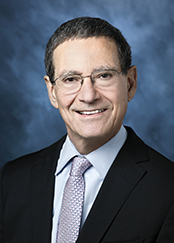D. Berman Lab
The D. Berman Lab is located within the Cedars-Sinai S. Mark Taper Foundation Imaging Center. Daniel Berman, MD, is the director of Cardiac Imaging Research, as well as lead of the D. Berman Lab. The research mission of the D. Berman Lab is to use cardiac imaging to discover novel ways to help reduce death and disability from cardiovascular diseases. The D. Berman Lab collaborates closely with the Dey Laboratory and Slomka Laboratory.

Personal Statement
Daniel S. Berman, MD, is director of cardiac imaging at Cedars-Sinai and professor of medicine at UCLA. He received his medical degree at the University of California, San Francisco, and then trained in internal medicine, nuclear medicine and cardiology at the University of California, Davis. In 1977, he was recruited to Cedars-Sinai to initiate a new program in nuclear cardiology, one of the first of its kind in the U.S. Since then, his career has been devoted to clinical research in developing, validating and applying noninvasive cardiac imaging methods for the detection of coronary disease and for risk assessment of patients once the diagnosis of coronary disease has been made.
Daniel S. Berman, MD
Breakthrough Research
- Assessing Diagnostic Value of Non-Invasive Fractional Flow Reserve Derived From Computed Tomography (FFRCT) in Coronary Care (ADVANCE)
- 18F-fluoride (18F-NaF) PET for Identifying Coronary Atherosclerotic Plaques
- 18-F Sodium Fluoride (18F-NaF) PET for the Assessment of Bioprosthetic Aortic Valve Durability and Outcomes
- Effect of EVOLocumab on coronary artery plaque Volume and composition by coronary CTA (CCTA) and microcalcification by F18-NaF PET
Publications
Learn more about the recent research publications from the D. Berman Lab.
Laboratory Team
Learn more about the scientists, faculty members, investigators and other healthcare professionals of the D. Berman Lab, whose dedicated efforts lead to groundbreaking discoveries.
Job Opportunities
We are actively recruiting students and postdocs to be our colleagues and expand lab knowledge and expertise to make important breakthroughs.
Collaborations
The D. Berman Lab collaborates with a wide range of investigators within Cedars-Sinai and institutions around the world.
- Brigham and Women’s Hospital
- Icahn School of Medicine at Mount Sinai
- Minneapolis Heart Institute Foundation
- University of Edinburgh